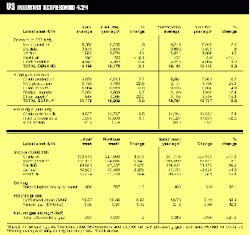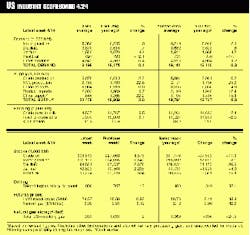OGJ Newsletter
The urge to merge-and thus consolidate both financial and knowledge resources-may be taking root in industry's professional organizations (OGJ, Jan. 4, 1999, p. 24).
GRI-formerly Gas Research Institute-and Institute of Gas Technology have agreed in principle to combine. Final approval to join the two natural gas research groups will come at concurrent board meetings Apr. 24.
John F. Riordan, named the new entity's CEO, said, "I enter this position with the charge to build a highly customer-directed organization providing innovation and business solutions for the energy industry. I'm confident that a combined company can meet that challenge, as demonstrated by growing revenues and important new initiatives at both GRI and IGT."
Among US government officials that lauded the groups' decision was FERC Chairman James J. Hoecker, who said, "One of the most challenging developments that the commission has promoted in recent times is the transition from federally regulatedellipsefunding to voluntary industry funding of gas researchellipse That's why the merger of GRI and IGT is such good news."
Merger and acquisition action in Canada shows no signs of slowing as bidding for Calgary-based Ulster Petroleums heated up with a $970.4 (Can.) million offer from Anderson Exploration, also of Calgary. The Anderson bid is about 20% higher than the $11/share offered by Dallas-based Hunt Oil Co. in what Ulster officials had called a hostile takeover bid (OGJ, Apr. 17, 2000, p. 42).
Anderson is offering $11 cash and one Anderson share for every 9.7 Ulster shares. It would also assume Ulster debt of $264 million. Anderson chairman J.S. Anderson said his company had almost completed an evaluation of Ulster when Hunt made its bid. Talks were held last weekend with Ulster, leading to the Anderson offer. Hunt owns almost 10% of Ulster stock and will likely come out ahead even if its bid fails. It bought 4.6 million Ulster shares in March for an average $8.30/share. Ulster stock closed Apr. 17 at $12.70/share.
Hunt officials said the company will assess the Anderson bid.
A seemingly endless string of e-venture partnership deals continues.
Six of the largest US gas and electricity firms are to develop an internet-based, business-to-business independent energy trading platform. Expected to be operational by yearend, the platform "initially will offer an over-the-counter marketplace for natural gas and electricity in North America," said Paul Addis, president of AEP Energy Services. Later, the platform will be expanded to include NGL, coal, weather derivatives, crude oil, and other energy-related commodities and instruments, he said.
According to Forrester Research, only 2% of gas trading and 0.2% of power trading was conducted on line in 1999. Forrester predicts that these figures will increase to a respective 25% and 11% by 2004. The founding firms are American Electric Power, Aquila Energy, Duke Energy, El Paso Energy, Reliant Energy, and Southern Co.
Meanwhile, 17 of the largest US buyers of petroleum joined the American Petroleum Exchange-an internet portal opening this summer that will connect refiners and marketers with their commercial account holders.
Charter members of the new exchange range from courier firms UPS and Federal Express to retailer Wal-Mart. These members will buy a total of 6 billion gal/year of gasoline and diesel fuel. Refiners, too, will be permitted a stake in the exchange-but no more than a small minority interest, to ensure neutrality.
The government of Canada's Northwest Territories will give conditional approval for construction of a natural gas pipeline through the Mackenzie Valley to connect with southern markets.
NWT Premier Stephen Kakfwi will meet with Ottawa officials within the next month to seek financial support for training and other initiatives as well as to negotiate a revenue-sharing agreement.
He said the territory will support a project that is substantially owned, operated, and managed by aboriginals. Kakfwi added that he expects a pipeline to be built well within 10 years.
The decision, albeit conditional, highlights a renewed interest in developing substantial natural gas reserves in the Mackenzie Delta and Beaufort Sea. Canadian majors Imperial Oil, Gulf Canada, Shell Canada, and Mobil Canada recently launched a 1-year study that will test the commercial viability and community support for oil and gas development in that region.
TransCanada PipeLines, one of the companies considering a pipeline project, says the size of the aboriginal groups' equity interest remains under discussion. Pipeline development plans in the area 25 years ago were shelved by poor economics and widespread community opposition in the Mackenzie Valley.
Meanwhile, US congressional budget negotiators have rejected a parliamentary attempt to open up to exploration the coastal plain of Alaska's Arctic National Wildlife Refuge-a provision inserted into the 2001 budget resolution by Sen. Frank Murkowski (R-Alas.). Passage was unlikely anyway, due to resolute opposition from the Clinton administration.
API Pres. Red Cavaney warns US EPA that its proposed limits on sulfur in diesel will cause shortages of the fuel. In a letter to EPA Administrator Carol Browner, Cavaney said, "To put it bluntly, our refining industry is unable to produce sufficient 15-ppm sulfur diesel, nor can our distribution system supply it across the country." The Office of Management and Budget is reviewing the proposed rule. Industry has proposed a 90% cut in diesel sulfur, resulting in a 30 ppm average and a 50 ppm limit for on-highway diesel fuel.
Chevron attorneys are optimistically reviewing other options after a federal judge in San Francisco recently accepted US jurisdiction in a civil suit against the company for alleged human rights violations in Nigeria.
That suit was brought by several California lawyers under the Alien Tort Claims Act, originally enacted in 1789 in an effort to combat piracy in international waters. Some see it as the latest in a growing number of cases in which plaintiffs are taking US companies to court in this country for laws allegedly broken abroad. Chevron officials say other motions are still pending to dismiss the suit, but even if it comes to trial, they remain confident that the company's conduct will be vindicated.
The suit stems from an incident in May 1998, when about 200 protestors boarded an offshore platform operated by a joint venture of Chevron Nigeria and Nigerian National Petroleum Corp. Chevron says the protestors held workers hostage for 3 days while it tried unsuccessfully to negotiate with them. The standoff ended when Nigerian government forces boarded the platform, killed two protestors, wounded another, and arrested several others. The security forces were flown to the platform on helicopters that were under contract to the JV.
Negotiators from Mexico and the US agreed on the division of the so-called Western Gap, a region in the central Gulf of Mexico more than 200 nautical miles from either country, settling an old dispute (OGJ, May 12, 1997, p. 27). According to Mexico Energy Sec. Luis Tellez, the gap will be divided with an equidistant line-a standard practice in maritime agreements. This division will leave Mexico with roughly 60% of the waters in question, with the remaining 40% falling on the US side.
The two sides are currently discussing how to divide any possible oil deposits straddling the new boundary, Tellez said, speaking with Mexican senators at a recent hearing. He gave no indication, however, on when any agreement would be ready for signing.
Meanwhile, Tellez has to defend his government's recent 4% increase in oil exports against opposition critics in the Mexican Senate, who accused him of bowing to US pressure (see editorial, p. 19). "We believe the increase is in our own best interests," Tellez said. "If I thought the world economy could handle $40/bbl and keep growing, that would be wonderful. But it cannot. And it is in our interests that the world economy continues to grow, so we can maintain [relatively] high prices."
Tellez says the Mexican government is aiming for an average price of $25-30/bbl for WTI: "This will allow us to maintain an adequate offer and a price level that maximizes Mexico's income in the medium term."
Sen. Francisco Xavier Salazar argues that rising inflation and interest rates in the US are not necessarily related to the high price of oil, and that Mexico should get as much money as possible for its oil. "I feel no remorse about selling at a high price when oil is in demand elsewhere, because when it is not needed, the price will surely go down," he said.

